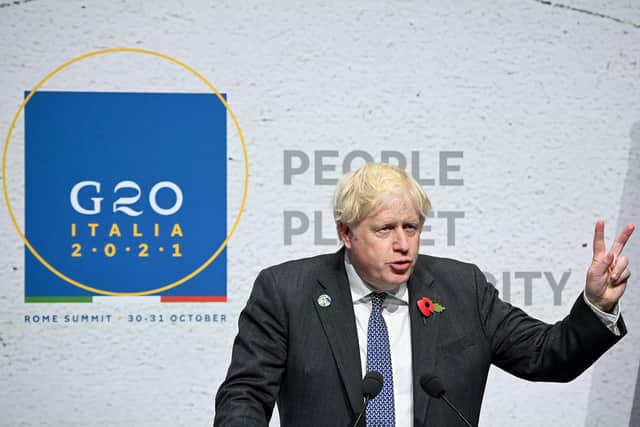COP26 climate change summit: World faces 'climate apartheid' as wealthy pay to escape and poor suffer – Tommy Sheppard MP
and live on Freeview channel 276
Some people will endure more than others, and that’s the case even with the effects we are feeling now. The rich can afford air-conditioning during heatwaves and power to warm their homes when it freezes.
When we look at the global picture, it’s starker still: 98.4 million people were affected by floods, storms, and climate-related disasters last year, the hottest on record. Most were poor people in poor countries. Five million died because of extreme heat or cold.
Advertisement
Hide AdAdvertisement
Hide AdThe UN warns of a developing “climate apartheid” with the wealthy paying to escape overheating, hunger, and conflict, while the rest of the world suffers.
This immorality is turbo-charged by the awful reality that the poor have these consequences visited upon them by the actions of the rich. Those paying the price did very little, if anything, to cause this crisis. In the last 25 years, well over 50 per cent of CO2 emissions were produced by the wealthiest ten per cent. The richer half of the world’s population generated 13 times as much CO2 as the poorer half.
That’s why COP26 needs not only to agree serious and sustained action to reduce emissions across the world, but recognise that tackling climate injustice is key to its delivery.
First off, we need to do better here. Scotland has ambitious targets, but we’ve not always quite hit them. The fact we’ve nearly got there needs to fuel a drive to do even better, not a counsel of despair. And the rest of the UK needs to follow Scotland’s lead and catch up.
Advertisement
Hide AdAdvertisement
Hide Ad

We need to speed up our transition away from fossil fuels, so why is Boris Johnson contemplating licensing the extraction of 800 million barrels from the new Cambo oil field? We need green public transport, so why is Rishi Sunak cutting taxes on domestic flights rather than encouraging renewable-powered electric train journeys?
Secondly, we must act globally. Millions already die from inequality through poverty, hunger, enforced migration, conflict and diseases. If half of humanity is currently condemned never to fulfil their potential, something needs to change. But in tackling global inequality and helping poorer countries to develop, one catastrophe must not be replaced by another: that of driving emissions and temperatures through the roof.
Rich countries must help poorer ones adapt their lives and livelihoods now, to ensure that wealth comes in a low-carbon and sustainable way. We need to take poor agrarian economies straight to high-tech green ones, by-passing the internal combustion engine and coal-fired generator. We need mass renewable energy production, electric transit systems, sustainable agriculture, and financing for health and education.
That’s why six years ago the Paris Agreement committed the world’s richest nations to helping the poorest. It’s in humanity’s collective interest to do this, and quickly.
Advertisement
Hide AdAdvertisement
Hide AdSadly, the targets set have not been achieved. The G20 countries need to get real. Instead of treating existing (diminishing) aid spending as climate contributions, we must provide extra money to help developing countries go straight to low-carbon. Renewing and upping this international effort is the single biggest thing that must come out of Glasgow next week.
Tommy Sheppard is SNP MP for Edinburgh East
A message from the Editor:
Thank you for reading this article. We're more reliant on your support than ever as the shift in consumer habits brought about by coronavirus impacts our advertisers.
If you haven't already, please consider supporting our trusted, fact-checked journalism by taking out a digital subscription.
Comment Guidelines
National World encourages reader discussion on our stories. User feedback, insights and back-and-forth exchanges add a rich layer of context to reporting. Please review our Community Guidelines before commenting.
